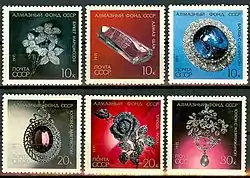Diamond Fund
The Diamond Fund (Russian: Алмазный фонд) is a unique collection of gems, jewelry and natural nuggets, which are stored and exhibited in the Kremlin Armoury in Russia. The Fund was opened in 1967 and its collection dates back to the Russian Crown treasury instituted by Emperor Peter I of Russia in 1719.
 Stamps exhibiting some of the Diamond Fund collection | |
| Established | 2 November 1967 |
|---|---|
| Location | Moscow, Russia |
| Type | Diamond collection |
| Website | Official site |
History
Imperial treasury
.jpg.webp)
_-_photo_by_Shakko_01.JPG.webp)
The gem collection of Peter I, established in 1719, was later stored in the Diamond Chamber (Бриллиантовая комната) in the Winter Palace. All succeeding monarchs added their contributions to the Chamber. A 1922 study by Alexander Fersman identified 85% of all exhibits to be from 1719 to 1855, to emperors Peter I through Nicholas I, and only 15% attributed from the last three emperors.
Catherine the Great exhibited a particular interest for expensive rocks, even naming her stallion "Diamond."[1] The Diamond Fund received more contributions from her than any other monarch.[2]
Soviet Union
%252C_18th_Century).jpg.webp)
Preservation, sales and looting of Imperial treasures after the Russian Revolution of 1917 are a matter of controversy and speculation. The Imperial collection was moved from Saint Petersburg to Moscow during World War I; the Soviet Diamond Fund was officially established in 1922.[3]
The treasure was first exhibited to the public in November 1967. Originally a short-term show, it became a permanent exhibition in 1968. During the late Soviet period, the value of the Fund's collection was estimated to be $7 billion.[4]
Russian Federation
The Russian State retains the monopoly for mining and distribution of gemstones, as set by the 1998 law "On precious metals and precious stones". Diamond Fund operations are regulated by the 1999 presidential decree (official text). The Diamond Fund is part of a larger State Fund of Precious Stones, managed by the Ministry of Finance, and accumulates the most valuable items, in particular
Recent additions
- 2006 – "The Creator" (Творец), mined in Yakutia in 2004. Third largest raw diamond in the Fund, 298.48 carats (59.696 g)[5]
- 2003 – golden nugget, 33 kg
- 1989 – "Alexander Pushkin", second-largest raw diamond, 320.65 carats (64.130 g)
- 1980 – "XXVI Congress of CPSU", largest raw diamond, 342.57 carats (68.514 g)
Major exhibits
Seven Historical Gems
.jpg.webp)
- Orlov diamond, 189.62 carats (37.924 g) {photograph}
- Shah diamond, 88.7 carats (17.7 g), first inscription dated 1591, a gift from the Shah of Persia in 1829
- Flat portrait diamond, 25 carats (5 g)
- Red spinel, set in the Imperial Crown of Russia, 398.72 carats (79.744 g), purchased in China in 1676
- Sapphire, 260.37 carats (52.074 g) {photograph}
- Colombian emerald, 136.25 carats (27.250 g)
- Olive-green chrysolite, 192.6 carats (38.52 g)
Crowns of Russia
- Imperial Crown of Russia made for Catherine II, 1762
Jewellery
Public access
The Diamond Fund is exhibited in the Kremlin Armoury building. For visitors, it is accessible only through tours of fixed duration due to the limited space inside the Fund. Tours in Russian are organized daily, at twenty-minute intervals. Foreign visitors can receive an audioguide in English, German, French, Spanish, Italian, Chinese or Japanese.[6]
References
- Зимин, Игорь (2013). "Ювелирные сокровища Российского императорского двора". Бриллиантовая комната Зимнего дворца (in Russian).
- Непомнящий, Николай (2008). 100 великих сокровищ России (in Russian). ISBN 978-5-9533-2698-8.
- official site Archived 2007-05-01 at the Wayback Machine
- Farrell-Robert, Janine (2007). Glitter & Greed: The Secret World of the Diamond Cartel. Red Wheel Weiser. p. 451. ISBN 9781609258801. Retrieved 15 July 2017.
- "Якутия передала в Алмазный фонд третий в России по величине алмаз" (in Russian). RIA. Retrieved 26 September 2018.
- "Information for visitors". Retrieved 26 September 2018.
External links
- Official website of the Diamond Fund
- Information for visitors
- History of the Diamond Fund from the Alexander Palace website